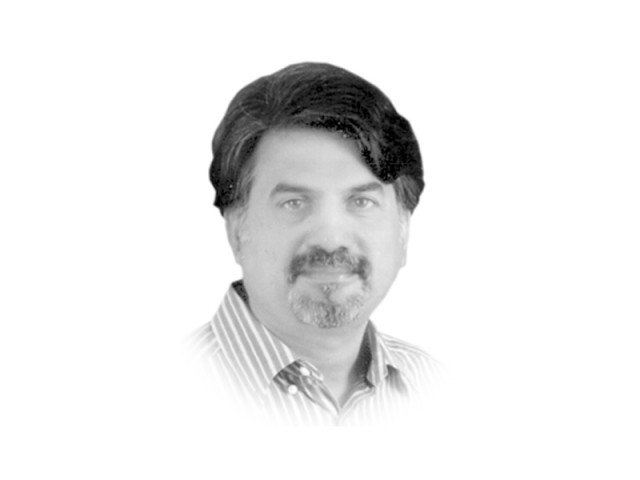When misrule backfires
Karachi is a city of rubbish dumps, a drainage system that awaits rain to demonstrate how neglected it is

The writer is a retired lieutenant colonel of the Pakistan Army and is currently pursuing PhD in civil-military relations from the University of Karachi
To many residents, barring the elite who live in the posh localities of DHA and Clifton, Karachi — deprived of any local government for the last seven years — already has the look of a failed city. It is a city of rubbish dumps, with roads that demand maintenance and repair, a drainage system that awaits monsoon rains to demonstrate how clogged and neglected it is, lack of water supply and electricity, and unruly traffic on the roads. (And I haven’t even mentioned a word on lawlessness and lack of security yet).
The MQM leader accused the Rangers of mistreating the people of Karachi. This is basically one man’s word against almost the entire population of the city, which believes that the Rangers are protecting the vulnerable people of Karachi from being used and abused. The MQM should realise that it was in government in Sindh along with the PPP for the last many years and it has had a definite hand in how the city, in all these years, benefited only a privileged few while the majority continued to suffer. Karachi and its people have not been let down by the armed forces of which the Rangers are an essential part. The leadership of the two major political parties of Sindh has let them down. The absolute lawlessness in the city is partly due to the mindset of the executors of ‘power politics’ in the city, who believe that ‘law is a big constraint on their political power’ and so they execute and maintain two sets of laws in the city — one for themselves and the other for the people they rule.
The Rangers, however, like any other disciplined institution, are not a law unto themselves. They tend to follow rules that have been established over time. Thus, when called upon to execute law-enforcement operations in the city, they are only likely to persist with defending all those ‘agreed upon rules and laws’ and apply them equally to all citizens, including those sitting in our legislative assemblies. Would the Rangers be called in if our politicians had realised in time that Karachi is on the verge of disaster?
Having looted and plundered the money that should have been utilised in providing public service and improving the life of the common people of Karachi, the non-delivering democracy in Sindh found itself devoid of any straight-forward reform agenda that could alleviate the woes of the city.
Thus, the political leadership reluctantly called upon the Rangers and gave them the mandate to take action (not against democracy itself, which actually failed the city of Karachi), but against terrorists, target killers, kidnappers and extortionists. And when the Rangers, to the utter dislike of those who rule the city, laid their hands on those committing financial crimes and corruption, the people who had called them in the first place started accusing them of having overshot the purview of their given authority and mandate. This was not because the Rangers had actually overshot their authority; this was because they were targeting those who had asked for their help in fixing the city.
All over the world, when politicians fail to bring order in areas under their control, they rely on a central authority as the guarantor of order and security to defend their cities against violent elements. But wait — the central authority here in Pakistan is its military. Its status as a central authority isn’t necessarily because it does not want to be subordinate to political authority. An important reason why it enjoys this status is because its political bosses often fail to rule in an able manner. The recent statements of the political leadership prove this. The ruling PML-N is not far behind either. Instead of an in-house reflection on why the names of its leaders have appeared in an inquiry list drawn up by NAB and shared with the Supreme Court, its leadership, including the speaker of the National Assembly, Ayaz Sadiq, and Information Minister Pervez Rashid, have threatened to file a reference against the NAB chairman. This speaks of the government’s resolve to root out corruption from the country.
There are two other noteworthy statements that we have come to hear in the last few weeks. One was by the DG Rangers, who in a recent tweet said, “Karachi law enforcement operation will continue till its logical conclusion is achieved, Insha Allah.” The other was by Altaf Hussain in which he had said that it is because of his teachings that the people are still patient and “the city will turn to Somalia if I am no more”. This speaks of an unfortunate state of affairs where battle lines have been drawn between non-delivering ‘democrats’ and the state’s central authority.
The hue and cry being raised by political leaders tells me that they might be fearing someone else usurping their political prerogative soon. It is quite unfortunate that what our leaders will consider to be a blow to democracy, the people of Karachi might just consider it the leaders’ well-deserved political Armageddon.
Published in The Express Tribune, July 23rd, 2015.
Like Opinion & Editorial on Facebook, follow @ETOpEd on Twitter to receive all updates on all our daily pieces.















COMMENTS
Comments are moderated and generally will be posted if they are on-topic and not abusive.
For more information, please see our Comments FAQ